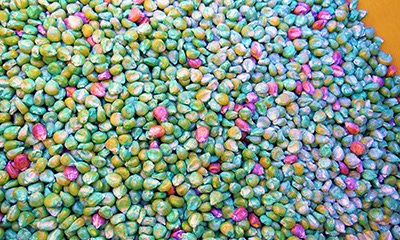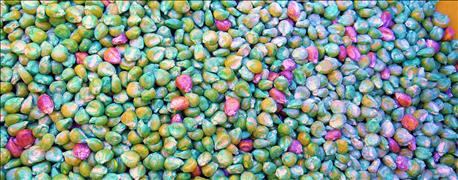September 14, 2015

With this year's hybrid performance, crop stresses and diseases freshly in mind, now is a good time to start analyzing what traits will be important when you shop for seed corn. You may be able to save money depending on traits you buy and which company you buy from. Seed Technology Consultant Dave Nanda, raises more than 13 tough questions to grill your seed company reps on.
1. Do I really need the traits I paid for in 2015 hybrids? He or she should be able to analyze what traits worked best for your farm and management plan.

WHAT'S IN THE BOX? Tightening breakeven margins warrant a hard look at the seed traits you need to invest in.
2. Why should I buy seed from your company? The seed industry is very competitive. Most seed companies have some good products. However, make sure they have products adapted to your soils with proven performance in your area.
3. What hybrids are you recommending? Any seed sales rep worth his or her salt should have some hybrids in mind that might fit your soils and needs. They should know those hybrids inside out, as well as if any are non-GMO varieties.
4. Why should I buy a hybrid I've never seen before? You don't have a chance to see every new product available since hybrids and technology are changing fast. Your seed rep should be able to provide data from universities, company test plots or independent test plots. You may want to try a few bags of a new hybrid the first time.
5. Where can I get data on newer hybrids? As a consultant, I'd recommend using test plots that include newer hybrids. Use multiple years of data if possible. Consider planting about 75% of your acres with hybrids that have done well on your farm during the last two to three years. Replace the last 25% with newer hybrids every year.
6. What are strengths and weaknesses of each hybrid? A sharp seed rep will know and admit if a hybrid is susceptible to diseases prevalent in your area. This year, northern corn leaf blight and gray leaf spot had a perfect storm in some fields due to a susceptible hybrid, lots of disease inoculum on corn-after-corn and a humid environment. That said, many good resistant hybrids are available from various companies.
7. What seed treatments do you use? Are different options available? Can I buy my seed without treatment?
~~~PAGE_BREAK_HERE~~~
8. Can you tell me about hybrids I can use in pairs to spread pollination risk or plant using multi-hybrid planter configurations? Some seed companies are beginning to collect that type of data.
9. Can you explain your discounts completely? Discount policies for early order, volume, early cash payments, seed pickup and early delivery vary from company to company. What if I can't take advantage of discounts because I can't get the money until next spring? Would I still get a volume discount that would apply then? Find out upfront before you make decisions so you won't be surprised later.
10. If I can't pay by your due date, what penalties might kick in, even if I forego discounts? How do I know you won't give a better deal later if you need to sell more seed next spring? If I buy now and you offer a better deal later, will I get the better deal, too?
11. What's your company's replant policy? I may not decide to buy just because a company says it'll provide 100% replant. But I need to know the rules of the game upfront before I start playing.
12. When do I have to take delivery? Would you be available on weekends if I need more seed during planting? Are seed returns allowed? If I change my mind after seed is delivered or I can't plant it and wind up with too much, can I return it? Does it matter why I didn't plant it? If I can return it, at what price will I be credited?
13. Does your company have agronomists who can help me diagnose problems with soil compaction, fertilizers, fungicides, diseases or insects, if needed? Several companies provide extensive training for their seed reps who deal with farmers.
It's better to clarify many of these points before signing on the dotted line. Remember, you're not only buying seed; you're looking for a partner who you can build a relationship with for the long term. He or she should know the products well and give you good service when you need it. Nanda is genetics and technology consultant for Seed Consultants Inc. Email him at [email protected].
You May Also Like




